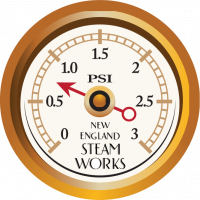Banging Radiators at start up
Hello all, I am having an issue with some steam radiators making loud noise at startup. Lots of pinging and banging until the radiators warm up. This is a 1 pipe system. All the ones that are making noise are all on the second floor. The first floor radiators are quiet as a church mouse. There are 6 radiators on the second floor. There are 4 branches going to the second floor. Branch one and two, both have two radiators. Both of these go into the floor, and you cannot see the piping. I am assuming there is a tee some place in the floor that feeds to both radiators. The 4th and 5th radiator is on its own pipe. One is quiet and the other makes a bit of soft pinging (could be heat expansion) and then stops after about 1 minute.. After ALL radiators heat up they are fairly quiet. All the radiators have new vents and proper pitch back to the valve. Also, I recently had the boiler cleaned. The pressuretrol never goes above .75 psi and there is adequate venting on the mains. When steam is being generated it takes about 5min to fully get rid of all the air in the mains. Any help on this would be appreciated.
Comments
-
Really important to distinguish between a water hammer and expansion — and can be hard to do! The pinging type noises you mention are, more likely than not, expansion — but locating what is sticking and slipping can be tricky. A louder bang type noise is likely to be water hammer.
Both can happen on warm up — and disappear once the system is heated up.
Worse, both can "telegraph: through the piping, making the actual source difficult to find. All that mumbo-jumbo aside, I'm thinking that if you do have water hammer type banging, it's worse on the radiators with shared risers, and that it is because one or both of the in-floor runouts to each pair is either not sloped enough, or sloped in the wrong direction and accumulating a small amount of condensate as it warms up. If they really are arranged connected by a T with a riser coming in the leg and the runouts on the cross, it's almost inevitable.
Br. Jamie, osb
Building superintendent/caretaker, 7200 sq. ft. historic house museum with dependencies in New England2 -
Hi Jamie, thank you for the feedback. What do you do to help with sticking and slipping. Some of the noises, i have narrowed down, but when the radiators moves slightly on the floor during expansion, not sure how i can address this issue.
0 -
Got milk? That is… the plastic jugs it comes in? Cut smallish squares of that stuff and slip it under the feet of the radiators. Works wonders, at least most of the time! Also, if you find places where pipes might rub against the flooring or other wood, slip a piece in there, too.
Br. Jamie, osb
Building superintendent/caretaker, 7200 sq. ft. historic house museum with dependencies in New England1 -
wonderful! definitely going to try that.
0 -
I oil between all radiator sections and tie rods every couple years. They are completely silent.
0 -
If it's water hammer, I would suspect that tee under the flooring, causing a bad pitch.
New England SteamWorks
Service, Installation, & Restoration of Steam Heating Systems
newenglandsteamworks.com0 -
I manage a 3-level apartment house with a single-pipe steam system. I believe another cause of noise can be water accumulated due to radiator users leaving the steam valve closed so that there is some steam gas leaking into the radiator from old, imperfectly-closed valves, but the accumulated condensate water fluid is unable to flow back down the pipe, being more dense than the gas. It is, of course, simple to solve this problem by simply opening the steam valve from time to time to let the accumulated water drain out. I am not a professional steam system person, but this comment is based on experience. When a radiator steam pipe on the lower floor also supplies a radiator in the upper floor, the actions of one user can affect the noise experienced by another user. I just advise everyone to open valves from time to time if they have a radiator that they keep shut off.
0
Categories
- All Categories
- 87.5K THE MAIN WALL
- 3.3K A-C, Heat Pumps & Refrigeration
- 61 Biomass
- 430 Carbon Monoxide Awareness
- 122 Chimneys & Flues
- 2.1K Domestic Hot Water
- 5.9K Gas Heating
- 117 Geothermal
- 170 Indoor-Air Quality
- 3.8K Oil Heating
- 78 Pipe Deterioration
- 1K Plumbing
- 6.6K Radiant Heating
- 395 Solar
- 15.9K Strictly Steam
- 3.5K Thermostats and Controls
- 57 Water Quality
- 51 Industry Classes
- 51 Job Opportunities
- 18 Recall Announcements



